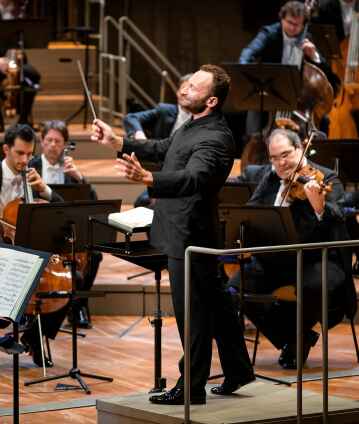Season opening 2020: Kirill Petrenko conducts Schoenberg and Brahms

The Berliner Philharmoniker’s opening concert of the 2020/21 season was awaited with particular excitement: on the one hand, it was the first time since the beginning of the corona pandemic that the orchestra was able to play in front of an audience, and on the other hand, chief conductor Kirill Petrenko was to play a work by Johannes Brahms with his orchestra for the first time. The Berliner Zeitung wrote about the performance of his Fourth Symphony: “The musicians play as if liberated, and you can hear: they have not forgotten anything in the past six months. The ending is triumphant.”
Arnold Schoenberg’s Verklärte Nacht – originally for string sextet, here in the version for string orchestra – is the first chamber music piece ever to be openly based on a programme. This caused a stir at the premiere, as the composer recalled: “One must not forget that this work was hissed at its first performance in Vienna and caused unrest and fistfights. But it was soon a great success.” The poem by Richard Dehmel, which inspired Schoenberg, is also provocative, as it questions moral concepts of the time. A man and a woman walk through the night: she confesses to being pregnant by another man; he wants to accept the child as his own. The speeches and responses, of roughly equal length, are framed by three shorter scene descriptions. The night is cloudless, the moon is shining, and what at first seems “bare” and “cold” appears “high” and “bright” at the end – a poetic treasure trove for Schoenberg, who exploits the tonality in his composition sensuously and with rich nuances.
Just as organically as the motifs in Schoenberg’s Verklärter Nacht develop from one another, the ideas in Johannes Brahms’s Fourth Symphony also appear to be extremely skilfully intertwined. In his last symphony, composed in 1884/85, Brahms looks both backwards and forwards: Johann Sebastian Bach, of all people, provided him with a model for something unprecedented. For his final movement, he borrowed the Baroque master’s blueprint for the chaconne for solo violin. An eight-bar bass line is constantly repeated without change. The musical events develop above it. However, what is immediately audible in Bach’s work, Brahms hides so well in his elaborate movement that even his friends did not recognise the principle for a long time when they puzzled over the form of the piece. There is also no clearly defined theme. Rather, these variations are 32 miniature essays on a thought that is only present in the background: “In a theme for variations,” Brahms said, “it is almost only the bass that has any meaning for me. But this is sacred, it is the firm foundation on which I then build my stories. What I do with a melody is only playing around.”
© 2020 Berlin Phil Media GmbH
Related interview
Artists
Our recommendations
- 2019 New Year’s Eve Concert with Kirill Petrenko and Diana Damrau
- Kirill Petrenko conducts Beethoven and Strauss at the Berlin Palace
- Kirill Petrenko conducts Puccini’s “Suor Angelica”
- Kirill Petrenko conducts Zimmermann, Lutosławski and Brahms
- 2020 New Year’s Eve Concert with Kirill Petrenko and Pablo Sáinz-Villegas
- Kirill Petrenko conducts Strauss, Shostakovich and Norman